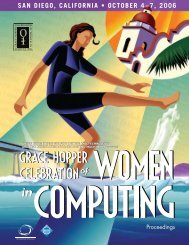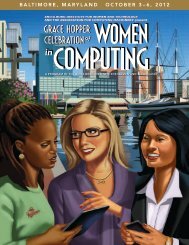ABI-ONE ghc program v14.indd - Grace Hopper Celebration of ...
ABI-ONE ghc program v14.indd - Grace Hopper Celebration of ...
ABI-ONE ghc program v14.indd - Grace Hopper Celebration of ...
Create successful ePaper yourself
Turn your PDF publications into a flip-book with our unique Google optimized e-Paper software.
achieves 88% accuracy, 2) deciding whether<br />
the extracted contours are in a loop shape<br />
in terms <strong>of</strong> geometric features <strong>of</strong> contours<br />
and an Adaboost classifier based C4.5 which<br />
achieves 85% precision and 83% recall.<br />
Query Processing over Distributed<br />
Wireless Sensor Networks in Future<br />
Internet<br />
Presenter: Shaila Pervin (Monash<br />
University)<br />
The terabyte torrent <strong>of</strong> data generated<br />
by billions <strong>of</strong> sensors belonging to<br />
distributed heterogeneous Wireless Sensor<br />
Networks (WSNs) in Future Internet will only<br />
be valuable if they are effectively used on<br />
purpose and this necessitates an efficient<br />
Internet scale query processing framework<br />
for WSN. In this work, by generating hierarchical<br />
characteristic model <strong>of</strong> each WSN,<br />
we outline the overall query processing<br />
methodology for Internet scale distributed<br />
WSNs.<br />
Raising the Level <strong>of</strong> Abstraction <strong>of</strong><br />
Parallel Programming<br />
Presenter: Ritu Arora (University <strong>of</strong><br />
Alabama at Birmingham)<br />
Writing efficient parallel applications is<br />
a complex task, mainly due to extra<br />
burden on the <strong>program</strong>mers to identify and<br />
express concurrency. The main goal <strong>of</strong> this<br />
research is to raise the level <strong>of</strong> abstraction<br />
<strong>of</strong> parallel <strong>program</strong>ming based upon MPI<br />
and OpenMP standards such that there is a<br />
significant reduction in the end-user effort<br />
without compromising on performance.<br />
Generative <strong>program</strong>ming tools are used to<br />
automate the process <strong>of</strong> generating parallel<br />
code.<br />
SRC POSTER SESSION<br />
W e d n e s d ay | s e p T 3 0<br />
SFS3: An Object-Oriented Simulation<br />
Framework for Self-Stabilizing Systems<br />
Presenter: Sally K. Wahba (Clemson<br />
University)<br />
protocol is self-stabilizing if its actions<br />
A guarantee that a given legitimacy<br />
predicate will eventually be satisfied regardless<br />
<strong>of</strong> the initial state. The self-stabilizing<br />
characteristic is particularly beneficial when<br />
designing large-scale networked systems.<br />
Despite the increasing use <strong>of</strong> self-stabilizing<br />
protocols, current network simulation tools<br />
do not support self-stabilizing systems. In<br />
this poster, we present SFS3 -- an objectoriented<br />
framework following a novel<br />
architecture to simulate the behavior <strong>of</strong><br />
self-stabilizing systems.<br />
Threshold Query Optimization for<br />
Uncertain Data<br />
Presenter: Yinian Qi (Purdue University)<br />
The probabilistic threshold query (PTQ)<br />
is one <strong>of</strong> the most common queries in<br />
uncertain databases, where all results satisfying<br />
the query with probabilities that meet<br />
the threshold requirement are returned. We<br />
investigate the general PTQ for arbitrary<br />
SQL queries that involve selections, projections<br />
and joins. We improve the efficiency<br />
<strong>of</strong> query execution by enabling alternative<br />
query plan enumeration for optimization<br />
that leverages the threshold for pruning, and<br />
experimentally verify our results.<br />
Towards Fast Mapping <strong>of</strong> Jammed<br />
Regions in WSNs<br />
Presenter: Nabila Rahman (University <strong>of</strong><br />
Texas at Arlington)<br />
Jamming attacks in Wireless sensor<br />
networks (WSNs) is difficult to prevent<br />
and in a large scale WSN, detection and<br />
mapping out the jammed regions is critical<br />
while maintaining the interactions among<br />
the low-powered sensor nodes to minimal.<br />
We propose a light-weight technique for<br />
faster mapping <strong>of</strong> the jammed regions,<br />
where the actual responsibility <strong>of</strong> mapping<br />
is assigned to the central base station,<br />
minimizing the load <strong>of</strong> the sensor nodes.<br />
Using Reverse Feedback Hints for I/O<br />
Load Balancing in MPI-IO and PVFS2<br />
Presenter: Christina M. Patrick<br />
(Pennsylvania State University)<br />
In large scale machines, there is a possibility<br />
<strong>of</strong> disproportionately distributing the<br />
I/O-load among the I/O-servers. This reduces<br />
the I/O-throughput causing bottlenecks. We<br />
propose modifying the I/O-stack to introduce<br />
hints. When these hints pass through the<br />
I/O-stack, they activate the runtime layer<br />
which collects statistics. This information is<br />
passed back using reverse feedback hints.<br />
Analysis <strong>of</strong> this information helps users<br />
identify the bottleneck, and redistribute the<br />
load to increase performance.<br />
World Model Learning through First<br />
Order Induction<br />
Presenter: Kathryn L. Genter (University <strong>of</strong><br />
Texas at Austin)<br />
Currently, simulators are <strong>of</strong>ten used to<br />
predict the effect <strong>of</strong> an agent’s actions<br />
in the world and in effect improve an agent’s<br />
performance. My work explores the use <strong>of</strong><br />
the first order inductive learning algorithm<br />
for learning rules which can be used to<br />
implement the different parts <strong>of</strong> a simulator.<br />
Specifically, I focused on building world<br />
models for predicting opponents’ strategies<br />
from collections <strong>of</strong> gameplay traces.<br />
Anita Borg Institute for Women and Technology | <strong>Grace</strong> <strong>Hopper</strong> <strong>Celebration</strong> <strong>of</strong> Women in Computing 45




